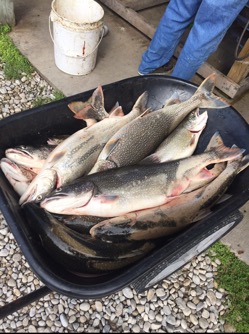
Regulation- size lake trout caught inLake Michigan. Image: John Lundwall
By Lauren Caramagno
A Port Huron angler once told Ethan Shirley that a fisherman’s job is to break the law as much as possible without getting caught.
It’s a challenging attitude to overcome when enforcing environmental laws, said Shirley, a law student at Michigan State University who is researching ways to encourage people to obey conservation laws.
“The Great Lakes are too large to be regulated at all times, therefore conservationists depend on local people to comply with rules,” he said. But “fishermen admit to not complying with fish size regulation laws.”
Shirley does his research in Brazil, but he says the concepts can be applied broadly across the world.
One solution is for scientists to better explain the need for limits on fishing and for other environmental regulations, Shirley said. Another is for those who enforce laws to build trust with the community that needs to obey them.
Police need to make themselves members of the community that are joining together and explaining rules to protect the environment versus implementing rules by sheer force, he said. “Many fishermen do not have a biological grasp of why laws are critical to follow.”
Taking such an approach to law enforcement could lead to more law-abiding anglers, said Shirley, who with other researchers has recently presented such ideas at the 2017 International Congress of Conservation Biology. They say they hope their research will soon be published in the Public Library of Science ONE and the Human Dimensions of Wildlife.
Successful management of wildlife throughout the Great Lakes states requires a high level of compliance with environmental laws, said Shirley, a masters and Juris Doctor candidate in MSU’s College of Law. That means it is important for people to understand them.
It’s also important to demonstrate that laws have a purpose by allowing communities to be a part of the law-making process, said Julie Viollaz, a criminology researcher at Michigan State University and colleague of Shirley. That increases the perception of legitimacy.
“Every person in a community has a role to play in the environment to protect wildlife, and if everyone plays that role, ecosystems would be balanced and more productive,” Viollaz said.
Two things determine compliance, Shirley said: One is massive enforcement which can be expensive, and the other is if citizens believe the law is right.
Nobel Prize-winning economist Ellen Ostrum found participatory management of natural resources is better than making laws and expecting people to follow them, Shirley said. In a top down system, scientists and politicians put into place rules that focus on ecological needs or human needs and do not balance the two. Participatory management minimizes the conflict between ecological needs of wildlife and the human needs of natural resources.
It’s a problem if biologists can’t communicate with local people about conservation, Shirley said. It leads to distrust and becomes a reason for noncompliance with laws.
Science is undermined when the public does not believe research, he said. In many cases it is an issue of inserting politics into science unnecessarily. This results in a lack of trust which is seen in controversial topics such as climate change and vaccine denial.
The lack of communication has caused a rift between scientists and communities. However, there is a push to make these connections through National Science Foundation grants, Shirley said. These grants now have a section titled broader impact that requires scientists to explain how they will connect their research to the needs of communities.
One positive trend is when fisheries researchers work directly with fisheries regulators who in turn work with anglers, Shirley said.
Accommodating people’s needs for conservation increases their compliance with the law, Viollaz said. “However, sometimes it’s not necessarily about giving people what they want, but letting them be heard.”